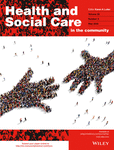Formal and informal support and counselling for embryo donation and receipt: An Australian qualitative study
Funding information
This work was supported by the Australian Research Council under a Future Fellowship (FT130100087) awarded to Professor Damien W. Riggs.
Abstract
Despite growing numbers of people engaging in embryo donation for the purposes of family building, public access to information about the process may be limited. As such, support and counselling – both formal (i.e. through clinics) and informal (i.e. through online communities) – can play an important role in information provision. This article draws on a sub-sample of nine people from a qualitative study of embryo donation and receipt in Australia undertaken in 2017–2018. Themes developed suggest that formal support and counselling provided by clinics can be useful, though can require persistence to access and may not sufficiently address needs. In terms of informal support, themes developed suggest that sharing lived experiences in online communities can be important; however, there may also be challenges associated with differing viewpoints and threats to anonymity. The article concludes with a discussion of the ongoing importance of formal support and counselling while also suggesting that informal support is an avenue requiring further investigation.
CONFLICT OF INTEREST
The authors do not have any conflicts of interest to declare.




